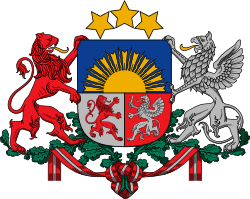Latvian Social Democratic Workers' Party
Latvian Social Democratic Workers' Party Latvijas Sociāldemokrātiskā Strādnieku Partija | |
|---|---|
 | |
| Leader | Jānis Dinevičs |
| Founded | 1918 |
| Headquarters | Riga |
| Youth wing | Social Democratic Youth Union |
| Membership (2017) | 633[1] |
| Ideology | Social democracy[2] |
| Political position | Centre-left |
| European affiliation | Party of European Socialists (observer)[3] |
| International affiliation | None |
| Colours | Maroon |
| Saeima |
0 / 100
|
| European Parliament |
0 / 9
|
| Website | |
| http://www.lsdsp.lv | |
 |
|---|
| This article is part of a series on the politics and government of Latvia |
| Foreign relations |
The Latvian Social Democratic Workers' Party (Latvian: Latvijas Sociāldemokrātiskā Strādnieku Partija, LSDSP) is a social-democratic political party in Latvia. It has a long history but is not represented in the current parliament of Latvia.
History
The Latvian Social Democratic Workers' Party was founded on 17 June 1918, by Menshevik elements who had been expelled from the Social Democracy of the Latvian Territory in 1915. Once Latvia became independent, LSDSP was one of the two most influential political parties (along with the Latvian Farmers' Union). LSDSP held 57 out of 150 seats in the 1920 Constitutional Assembly (Satversmes Sapulce). It won the most seats in each of four parliamentary elections of that period (31 out of 100 in 1922, 33 in 1925, 26 in 1928 and 21 in 1931). The leader of the LSDSP, Pauls Kalniņš, was speaker of the Latvian parliament from 1925 to 1934.
The party itself, however, would often be in opposition because of many smaller right-wing parties forming coalition governments, typically led by the Latvian Farmers' Union.
The party was a member of the Labour and Socialist International between 1923 and 1940,[4] and was admitted into the modern Socialist International in 1994.[5]
The LSDSP was banned after the 1934 coup by Kārlis Ulmanis, together with all other political parties, and remained banned after the Soviet annexation in 1940. When many Latvians left Latvia during World War II, the LSDSP was restored as an "exile organization", operating in Sweden in 1945, and later in other Western countries.
When Latvia became independent again in 1991, the LSDSP returned to Latvia. In the early 1990s, it struggled with internal splits. At one point, Latvia had three social democratic parties, two of them being descendants of the LSDSP, and the third being the reformed faction of the former Communist Party of Latvia (LSDP). Eventually, all three parties merged, under the name of the LSDSP.
The merged party enjoyed some success in the parliamentary election of 1998, winning 14 seats out of 100; and in local elections in 2001, when one of its members, Gundars Bojārs became the mayor of Riga. It was less successful in the next legislative election, held on 5 October 2002, where it got only 4% of the vote, and did not make the 5% minimum to get seats. The decline of the LSDSP's popularity continued as the party lost the mayor's seat in Riga in the 2005 municipal election (keeping 7 seats in the Riga City Council but forced into the opposition). The parliamentary election of 2006 brought even more dissatisfying results for the LSDSP, as the party got 3.5% of votes and thus got no representation in the parliament once again.
The party is led by Aivars Timofejevs, as of November 2011.
In 2012 the Socialist International demoted LSDSP to observer member for not paying membership fees. The party was officially delisted from the Socialist International in December 2014. It currently maintains the status of observer member in the Party of European Socialists.
Election results
Parliament (Saeima)
| Election year | Votes | % | Seats | +/– |
|---|---|---|---|---|
| 1920 | 274,877 | 38.8 | 57 / 150 |
|
| 1922 | 241,947 | 30.6 | 30 / 100 |
|
| 1925 | 260,987 | 31.4 | 32 / 100 |
|
| 1928 | 226,340 | 24.3 | 25 / 100 |
|
| 1931 | 186,000 | 19.2 | 21 / 100 |
|
| Banished under the Latvian Soviet Socialist Republic | ||||
| 1993 | 7,416 | 0.7 | 0 / 100 |
|
| 1995[lower-alpha 1] | 43,599 | 4.56 | 0 / 100 |
|
| 1998[lower-alpha 2] | 123,056 | 12.9 | 14 / 100 |
|
| 2002 | 39,837 | 4.0 | 0 / 100 |
|
| 2006 | 31,728 | 3.5 | 0 / 100 |
|
| 2010[lower-alpha 3] | 6,139 | 0.65 | 0 / 100 |
|
| 2011 | 2,531 | 0.28 | 0 / 100 |
|
| 2014 | Did not participate | |||
| 2018[lower-alpha 4] | 0 / 100 |
|||
- ↑ Results for Labour and Justice Coalition.
- ↑ Results for Latvian Social Democratic Alliance.
- ↑ Results for Responsibility – Social Democratic Alliance of Political Parties.
- ↑ Results for SKG Union.
See also
References
- ↑ "Latvijā partijās daudzkārt mazāk biedru nekā Lietuvā un Igaunijā. Kāpēc tā?" (in Latvian). LSM.lv. 2 January 2018. Retrieved 1 July 2018.
- ↑ Parties and Elections in Europe: The database about parliamentary elections and political parties in Europe, by Wolfram Nordsieck
- ↑ "Archived copy". Archived from the original on 3 May 2013. Retrieved 2013-04-25.
- ↑ Kowalski, Werner. Geschichte der sozialistischen arbeiter-internationale: 1923 - 19. Berlin: Dt. Verl. d. Wissenschaften, 1985.
- ↑ James C. Docherty; Peter Lamb (2 October 2006). Historical Dictionary of Socialism. Scarecrow Press. pp. 203–. ISBN 978-0-8108-6477-1.
External links
- Official website (in Latvian)